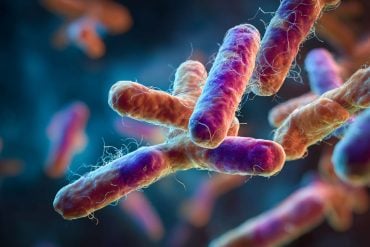Summary: A new study highlights the link between gut health and post-COVID syndrome (PCS), revealing that patients with prior gastrointestinal issues are more likely to experience post-viral fatigue. Researchers analyzed samples from PCS patients and identified key immune and gut-related biomarkers linked to inflammation and intestinal barrier dysfunction.
Notably, altered levels of IL-6 and a higher LBP/sCD14 ratio suggest chronic immune activation in PCS sufferers. These findings suggest gut monitoring may be vital in predicting and managing long-term post-COVID symptoms.
Key Facts:
- Immune Changes: PCS patients showed increased inflammatory markers like IL-6 and an elevated LBP/sCD14 ratio.
- Gut Health Matters: Individuals with prior gastrointestinal symptoms were more likely to develop post-viral fatigue.
- Predictive Potential: Monitoring gut-related biomarkers may help identify and treat PCS earlier.
Source: Medical University of Vienna
In a recent study, a research team from the Medical University of Vienna has gained new insights into post-COVID syndrome (PCS) and the relevance of a healthy gastrointestinal tract.
The study, which was recently published in the journal Allergy, shows that PCS patients have altered inflammatory markers and a disturbed intestinal barrier, which could contribute to the development of post-viral fatigue.

The researchers, led by Eva Untersmayr-Elsenhuber from MedUni Vienna’s Center for Pathophysiology, Infectiology and Immunology, analyzed data from a prospective observational study.
The course of SARS-CoV-2 infections and gastrointestinal symptoms before, during and after the infection were examined. In addition, blood, saliva and stool samples from PCS patients were analyzed.
The results show that patients with pre-existing gastrointestinal complaints have an increased risk of developing PCS fatigue. At the same time, prominent changes were found in certain biomarkers.
For example, PCS patients showed an increased LBP/sCD14 ratio and lower IL-33 levels, which indicates altered immune activation and a reduced intestinal barrier. In addition, there were increased IL-6 levels, which are considered a marker for systemic inflammatory reactions.
“Our results suggest that SARS-CoV-2 infection can have long-term effects on the immune system and intestinal health that contribute to the development of PCS,” explains Eva Untersmayr-Elsenhuber. She is co-director of the National Reference Center for Postviral Syndromes at MedUni Vienna.
Developing targeted treatment strategies
The study underlines the central role of the gastrointestinal tract in the development of long-term consequences after COVID-19. Monitoring gastrointestinal symptoms and biomarkers could help to identify at-risk patients at an early stage and develop targeted treatment strategies. This could be particularly important for the treatment of post-viral fatigue.
“What is particularly exciting is that our study participants were mostly young and healthy before the infection. Even the Covid disease was mostly mild or even asymptomatic.
“One difference was the more frequently reported gastrointestinal complaints in the group that developed post-viral fatigue,” explains Johanna Rohrhofer from the Center for Pathophysiology Infectiology and Immunology, lead author of the study.
The research team plans to validate the findings in further studies. “The identification of predictive markers for PCS could enable personalized prevention and treatment in the future,” says Eva Untersmayr-Elsenhuber.
About this post COVID fatigue research news
Author: Karin Kirschbichler
Source: Medical University of Vienna
Contact: Karin Kirschbichler – Medical University of Vienna
Image: The image is credited to Neuroscience News
Original Research: Open access.
“Gastrointestinal Barrier Disruption in Post-COVID Syndrome Fatigue Patients” by Eva Untersmayr-Elsenhuber et al. Allergy
Abstract
Gastrointestinal Barrier Disruption in Post-COVID Syndrome Fatigue Patients
Background
Post-COVID Syndrome (PCS) is the term for a condition with persistent symptoms in a proportion of COVID-19 patients after asymptomatic, mild, or severe disease courses. Numbers vary, but the current estimate is that after COVID-19 approximately 10% develop PCS.
The aim of our study was to evaluate the impact of SARS-CoV-2 infection on the gastrointestinal (GI) tract and associations with the development of PCS with fatigue, post-exertional malaise (PEM), orthostatic dysregulation, autonomous dysregulation, and/or neurocognitive dysregulation.
Methods
By combining medical record data from a prospective observational study with symptom analysis before, during, and after SARS-CoV-2 infection, we aimed to identify potential risk factors and predictive markers for PCS. Additionally, we analyzed blood, saliva, and stool samples from this well-characterized PCS patient cohort to biologically validate our findings.
Results
We identified significant associations between pre-existing GI complaints and the development of PCS Fatigue. PCS patients showed higher LBP/sCD14 ratios, lower IL-33 levels, and higher IL-6 levels compared to control groups. Our results highlight the critical role of the GI tract in PCS development of post-viral Fatigue.
Conclusion
We propose that the viral infection disrupts pathways related to the innate immune response and GI barrier function, evidenced by intestinal low-grade inflammation and GI barrier leakage. Monitoring GI symptoms and markers before, during, and after SARS-CoV-2 infection is crucial for identifying predictive clinical phenotypes in PCS.
Understanding the interaction between viral infections, immune responses, and gut integrity could lead to more effective diagnostic and treatment strategies, ultimately reducing the burden on PCS patients.







